UK politics news
A selection of recent UK and international news articles
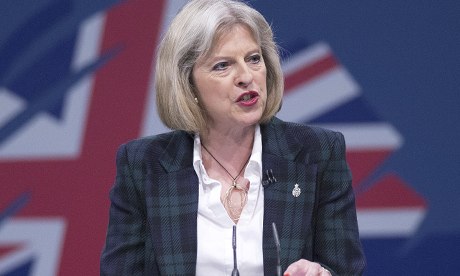 Home Secretary waited until terror suspect was abroad before stripping citizenship | The Bureau of Investigative Journalism … [Home Secretary Theresa May] denied that it has a policy of waiting until individuals are out of the UK before removing their citizenship. But research by the Bureau has also found that of the 18 individuals we have identified who have lost their UK nationality removed since 2006, at least 15 were known to be abroad when orders to remove their citizenship were issued. Of those individuals, two – Mohammed Sakr and Bilal al-Berjawi – were killed in US drone strikes in Somalia. Another, Mahdi Hashi, was rendered to the United States where he’s currently awaiting trial on terror charges in a high-security jail. Speaking in the parliamentary debate, Diane Abbott pointed out that debate around citizenship-stripping often failed to presume the innocence of individuals who had not faced criminal charges. ‘We are talking about terror suspects. Nowadays in Parliament, saying that someone is suspected of terrorist activity is enough for the political class to assume that that person does not deserve due process,’ she said. …
Home Secretary waited until terror suspect was abroad before stripping citizenship | The Bureau of Investigative Journalism … [Home Secretary Theresa May] denied that it has a policy of waiting until individuals are out of the UK before removing their citizenship. But research by the Bureau has also found that of the 18 individuals we have identified who have lost their UK nationality removed since 2006, at least 15 were known to be abroad when orders to remove their citizenship were issued. Of those individuals, two – Mohammed Sakr and Bilal al-Berjawi – were killed in US drone strikes in Somalia. Another, Mahdi Hashi, was rendered to the United States where he’s currently awaiting trial on terror charges in a high-security jail. Speaking in the parliamentary debate, Diane Abbott pointed out that debate around citizenship-stripping often failed to presume the innocence of individuals who had not faced criminal charges. ‘We are talking about terror suspects. Nowadays in Parliament, saying that someone is suspected of terrorist activity is enough for the political class to assume that that person does not deserve due process,’ she said. …- The state assassination of a US citizen foretold – World Socialist Web Site
- NSA spying poses “direct threat to journalism,” watchdog group warns – World Socialist Web Site
- European Parliament kills call to protect Edward Snowden – World Socialist Web Site
- Valentines Day: Couples split up by Home Office express their anguish
- Comment: How Jeremy Hunt plans to sell your NHS records
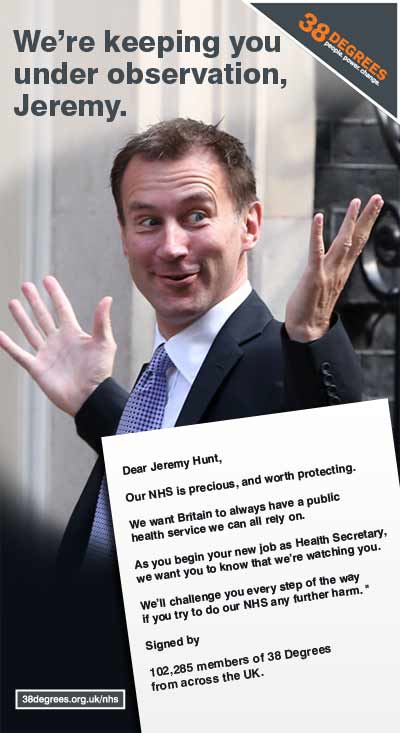
38degrees warn Jeremy Hunt about the NHS If the government gets its way, from May this year your family’s patient-identifiable data will be uploaded from your GP surgery to a single, centralised database for the very first time. This ‘care-data’ database will include your NHS number, date of birth, postcode, ethnicity and gender. Your medical diagnoses, including cancer and mental health, your referrals to specialists, your prescriptions, your body mass index, details of your vaccinations and screening tests and your smoking and alcohol habits will be on there too.
The scheme, led by health secretary Jeremy Hunt, is being hailed as a revolution in the use of information to improve our healthcare and to advance medical research – admirable aims indeed. But once it goes live, organisations including drug and insurance firms will be able to apply to purchase ‘pseudonymised’ details about patients. And ‘backdoors’ to the database will allow bodies like the police to enjoy direct access to your medical records as well.
- Cameron ditches promise to allow public to sack MPs
- Boris ‘prioritising super rich’ amid new flat development
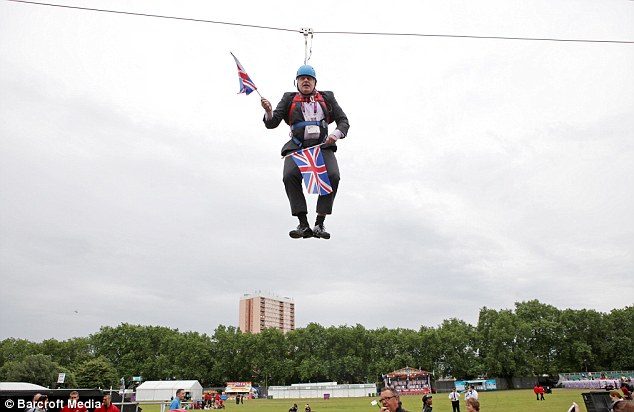
- Is free speech on drugs being censored by corporate giants? The disappearance of a YouTube channel. | openDemocracy
- Coalition spends millions sacking and rehiring Government officials – Telegraph
- The NHS is not like a supermarket. Patients are not consumers. | NHA Party
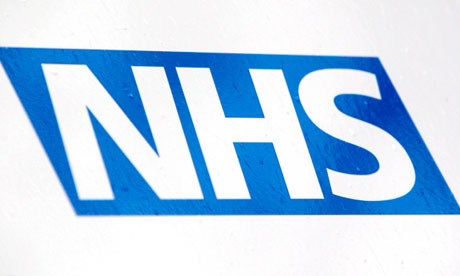
- These floods are washing away the founding logic of David Cameron’s government | Jonathan Freedland | Comment is free | The Guardian… But that is the least of the damage that Cameron’s words have inflicted on himself. For this government was built, the coalition formed, on a single, simple premise: that austerity was unavoidable, that there was no alternative. There could be no more spending, an assertion endorsed by the outgoing Labour government in what must rank as one of the most ill-judged jokes of modern times: “There’s no money left,” said Liam Byrne in a note left for his successor at the Treasury. But now, less than four years on, it turns out that this is no longer true. The PM has told us that, should the need be urgent enough, there is money after all. Limitless supplies of it in fact; enough to defeat nature’s wrath. To quote Cameron in full, “Money is no object in this relief effort. Whatever money is needed for it will be spent.” This rather undermines the austerity message, for it shows what was always true – that the national belt is not tightened universally and for ever but can be loosened when the government wants to loosen it. The last demonstration of that truth came nearly two years ago, when George Osborne cut the top rate of tax from 50p to 45p. That destroyed at a stroke the claim that we were all in it together, but it also illuminated a more obvious fact: that, despite all the “no alternative” talk, the government had not lost its power of discretion. Even in the age of austerity, it still got to decide what to spend money on and what not to spend it on. …
- Welfare reforms a ‘disgrace’, says UK’s most senior Catholic | World news | The Guardian
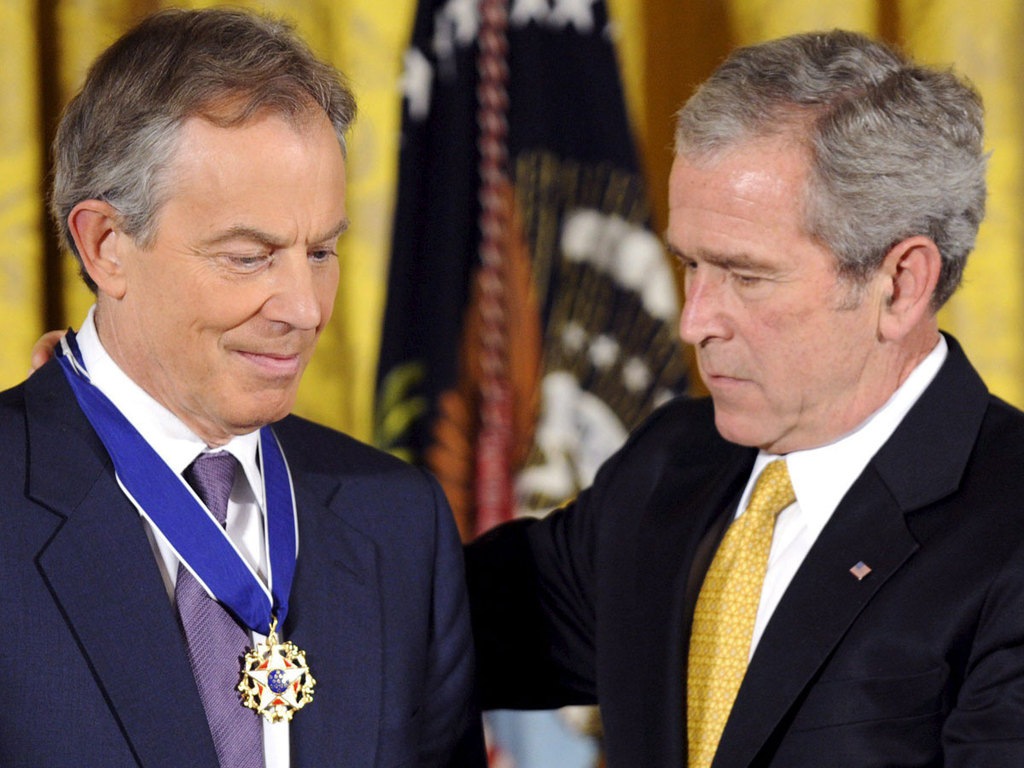
Traitor Tony Blair receives the Congressional Gold Medal of Honour from George ‘Dubya’ Bush - War-weary Britain: “The Iraq war was where it all started for me” | World news | theguardian.com
- Your bills help British Gas to £600m profit – Business News – Business – The Independent Centrica is set to announce on Thursday that its British Gas household supply arm made a profit of nearly £600m last year, helped by a 10.4 per cent hike in gas prices in November and an 8.4 per cent rise in electricity prices. Politicians and campaigners said the bumper profits provided further evidence that showed the Big Six were overcharging customers in an uncompetitive market.
-

Image of a badger - BBC News – Scarborough Mayor Jaconelli abuse claims investigated by policeSavile associate Peter Jaconelli
- Fish farms are destroying wild Scottish salmon, says leading environmentalist | UK news | The ObserverAlex Salmond “accused of overheating production of Scottish farmed salmon to meet China’s insatiable demand for sushi in return for its loan of two pandas to Edinburgh Zoo.”
17/2/14 edit: That would be Alex Salmon “accused of overheating production of Scottish farmed salmond to meet Japan’s insatiable demand for sushi in return for China’s loan of two pandas to Edinburgh Zoo.”
- Bottom trawling: how to empty the seas in just 150 years | Environment | The Observer“For every hour spent fishing today, in boats bristling with the latest fish-finding electronics, fishers land a mere 6% of what they did 120 years ago. Put another way, fishers today have to work 17 times harder to get the same catch as people did in the 19th century.” And the reason for this startling state of affairs is straightforward: we have caught so much fish in our own waters over the past 150 years, there is little left for us today. Some species hover at the edge of extinction. Our seas, and the floor below them, have been stripped of their riches.